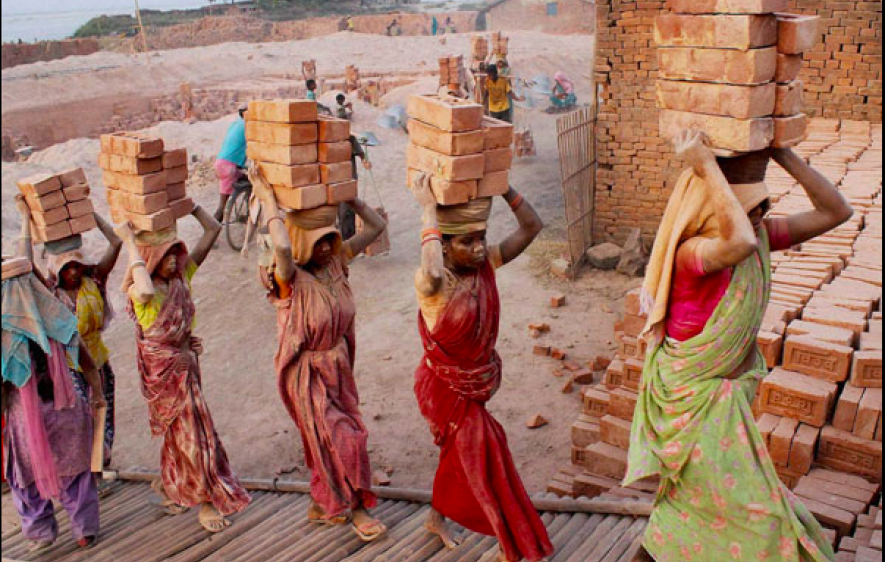Irony of Women Workers: Unpaid for Working More Than 8 Hours

The Tamil Nadu (TN) Assembly passed The Factories (Karnataka Amendment) Bill, 2023, on April 21. The amendment to Section 65 of The Factories Act, 1948, included clause 65A, which exempted “any factory, or group or class or description of factories from any or all of the provisions of Sections 51, 52, 54, 55, 56 or 59 of the Act”, so that they can extend the daily working hours from 9 to 12.
The MK Stalin government, however, withdrew the Bill on May 1 after vehement opposition by its alliance partners, workers, trade unions and the public in general. Nonetheless, it triggered heated discussions on the issue.
In the post-liberalisation period, the ‘efficiency’ argument has become an important point of convergence for both capitalists and trade unions regarding working conditions.
While industrialists argue that flexible working hours will help increase daily production, trade unions say that increasing working hours beyond eight hours might affect efficiency in production due to fatigue.
The other side of the ‘efficiency’ argument, mainly from progressive voices, is based on ‘rights’. The eight-hour work norm is the outcome of historical workers' struggle. In fact, the triple 8 slogan (8 hours of work, 8 hours of sleep and 8 hours of leisure) is the synonym for a contented human life.
Hence, workers should vehemently oppose changes in the eight-hour norm as it deprives them of their rights. However, if a contented life is everybody’s right, does this include women?
Who is a worker
Whoever gets paid for work is seen as a worker barring a few exceptions. Only work that can be quantified monetarily and linked to the market is considered productive. All other labour is not regarded as productive work.
Our concern, specifically in India, is the large number of women engaged in various kinds of social reproductive work, most of which is not recognised as work. Consequently, they are neither paid nor recognised as workers, including domestic and care work and all other subsistence work ensuring the household’s daily survival.
In fact, this kind of work helps to socially reproduce labourers and their labour power, known as socially reproductive work. Feminists have long advocated that recognising unpaid work will push men to share this work at home equally.
Though various women’s movements have made a continuous effort to bring to light the productive nature of their work, the silence on recognising them as productive work persists.
Therefore, women’s unpaid work will not be recognised anytime soon. Given these circumstances, it is important to understand the impact of non-recognition of women’s unpaid work on their empowerment.
The NSS Report: Time Use in India-2019 provides us with some clarity in understanding women’s work. Work performed by 86.8% of men in rural areas and 89.7% in urban areas are under the System of National Accounting (SNA), an account of ‘productive’ work. However, work performed by 76.7% of women in rural areas and 81.1% in urban areas are grouped under non-SNA, an account of ‘unproductive’ work.
India recently surpassed China in having the highest population globally. India also has a vast young population—around 65% is under 35.
Interestingly, 85.8% of women in the 15-29 age group are engaged in unpaid domestic work for household members for 4.85 hours daily compared to 24.2% of men for 1.5 hours. The engagement in unpaid domestic work rises to 92.3% for women in the 15-59 age group with 5.25 hours daily compared to 28.9% of men for 1.5 hours.
This unpaid domestic work does not include unpaid care services and other unpaid work, which women additionally perform. In contrast, 73.5% of men workers in rural areas and 87.9% in urban areas are paid. This gender division of labour with overwhelmingly high participation in unpaid domestic work puts women in a disadvantageous position in income generation.
Women’s engagement with work is unpaid and largely considered non-productive. We continue to see women as non-workers, invisible and mostly non-recognised, leading to continued gender inequality.
Women’s economic dependence on men leads to inter-generational inequality in access to quality professional education, skill development, social and economic mobility, violence-free life and bargaining power within and outside their home, hindering their empowerment.
Several research reports, including the Global Gender Gap Report-2022, have shown the direct benefit of the ability to generate income and employment participation to women's overall well-being.
Women’s work in Tamil Nadu
A Female Work Participation Rate (FWPR) of only 32% in
TN is one of the highest in the country. What does this indicate? A large number of women continue to do unpaid work.
In TN, 92.9% of women in rural areas and 90.4%in urban areas perform non-SNA work. The average time spent on unpaid work is more than five hours for rural and urban women. It further cements the argument that certain sections of women continue to engage in various unpaid activities and may be doing more than eight hours of work.
Women doing paid work continue to perform unpaid work (double shifts), which is normalised in such a way that labour rights, liberal values of individual rights and freedom, etc. do not apply to them. Working more than eight hours is not seen as exploitation but as a role to be performed by a dutiful wife or a loving mother.
Various reports, including National Commission for Enterprises in the Unorganised Sector 2007 and 2009, have pointed out a clear gender division of labour even in paid work.
In TN, women workers are largely employed in manufacturing, textile, various micro, small and medium enterprises, information technology-enabled Services and informal sectors.
While presenting the Bill, the DMK government claimed, “This would immensely benefit women workers.” However, how exactly will it benefit women workers was unclear. One of the ministers suggested that the remaining three days would be paid leave.
How are women expected to utilise the three non-working days—in travel, recreation, entertainment or simply relax and enjoy a cup of tea? Do the three days also mean leave from household work? Could a woman take leave or a day’s break from unpaid work in the household?
The silence on the gender division of labour has kept the FWPR low and led to the overexploitation of women workers in general, particularly those performing both paid and unpaid work.
In the recent past, the state government introduced free bus travel for women, a monthly female education fund, and included breakfast in the Mid Day Meal Scheme, which have not only benefited women in general but also facilitated their engagement in paid work.
In contrast, the Bill was out of sync with the state government’s overall thrust on empowering women. It shows that the government neither understands women’s work nor has a comprehensive vision for facilitating their emancipation.
The writer is an assistant professor at the School of Development, Azim Premji University, Bengaluru.
Get the latest reports & analysis with people's perspective on Protests, movements & deep analytical videos, discussions of the current affairs in your Telegram app. Subscribe to NewsClick's Telegram channel & get Real-Time updates on stories, as they get published on our website.
























